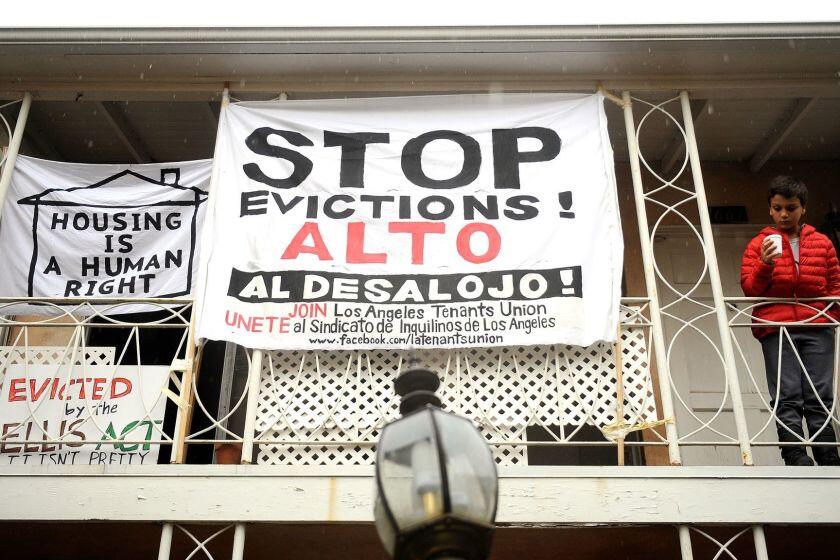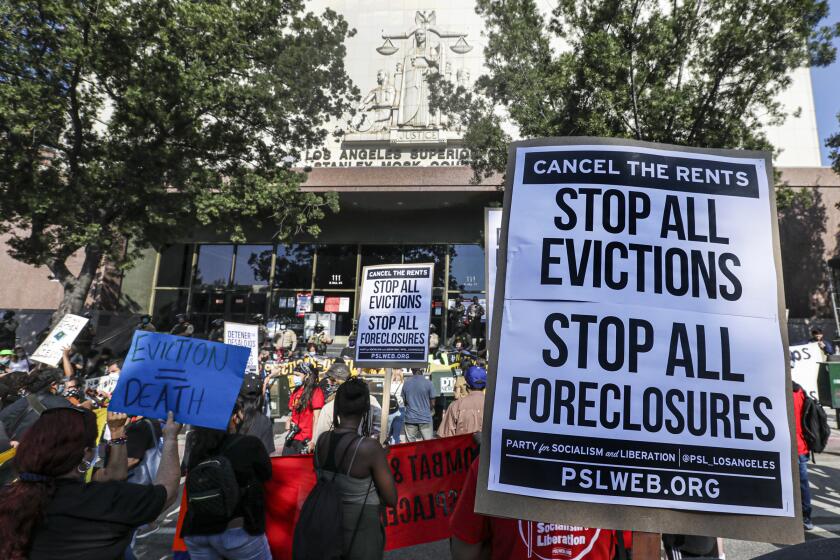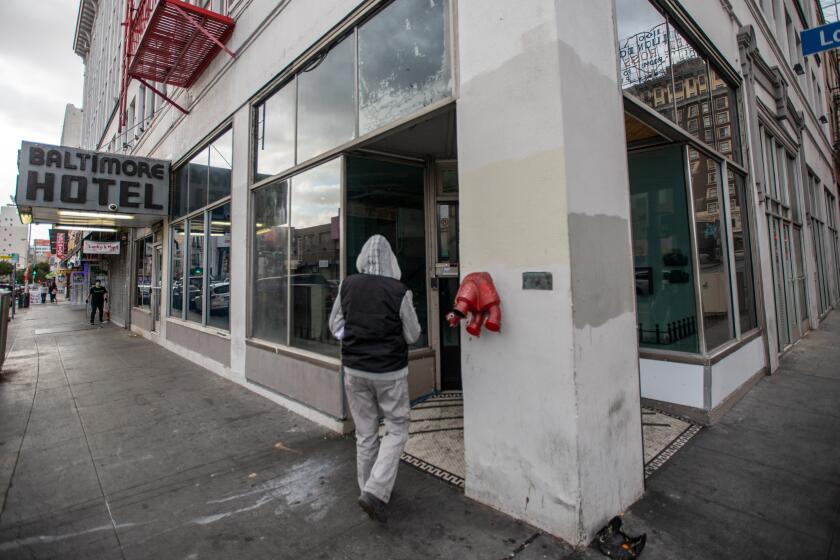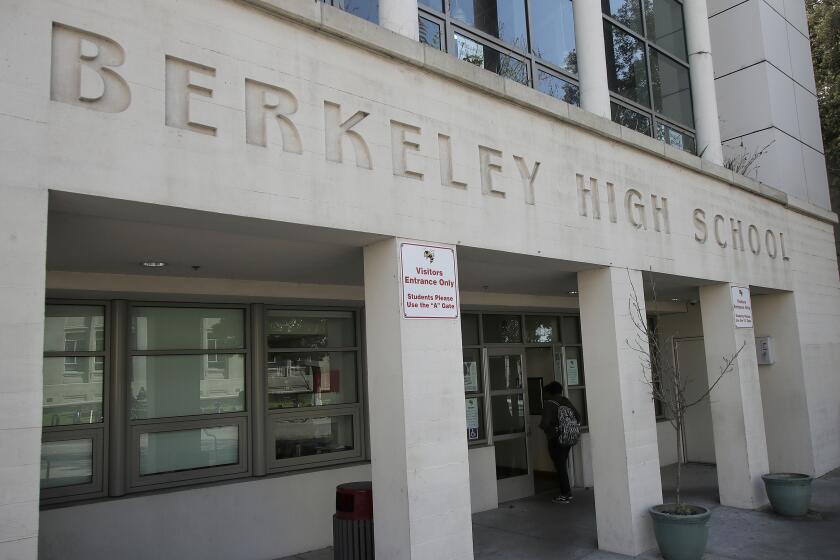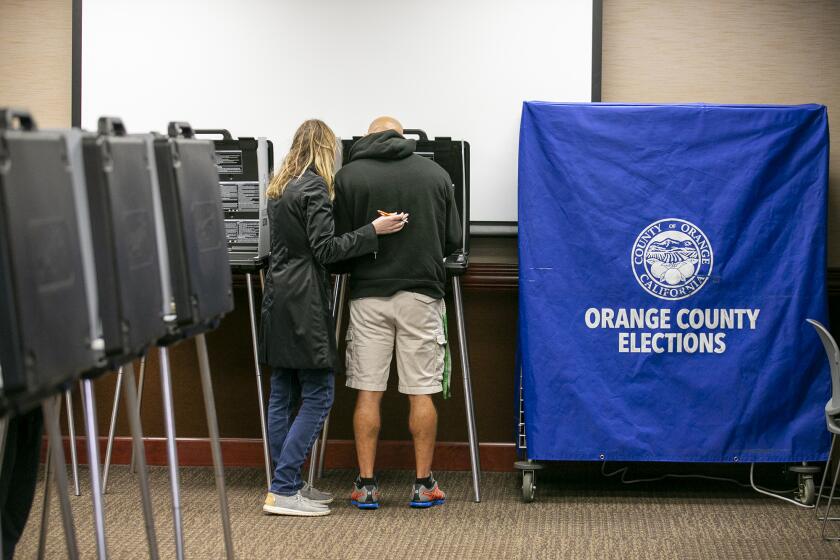Californians with low incomes to receive $600 checks under $9.6-billion COVID-19 economic package
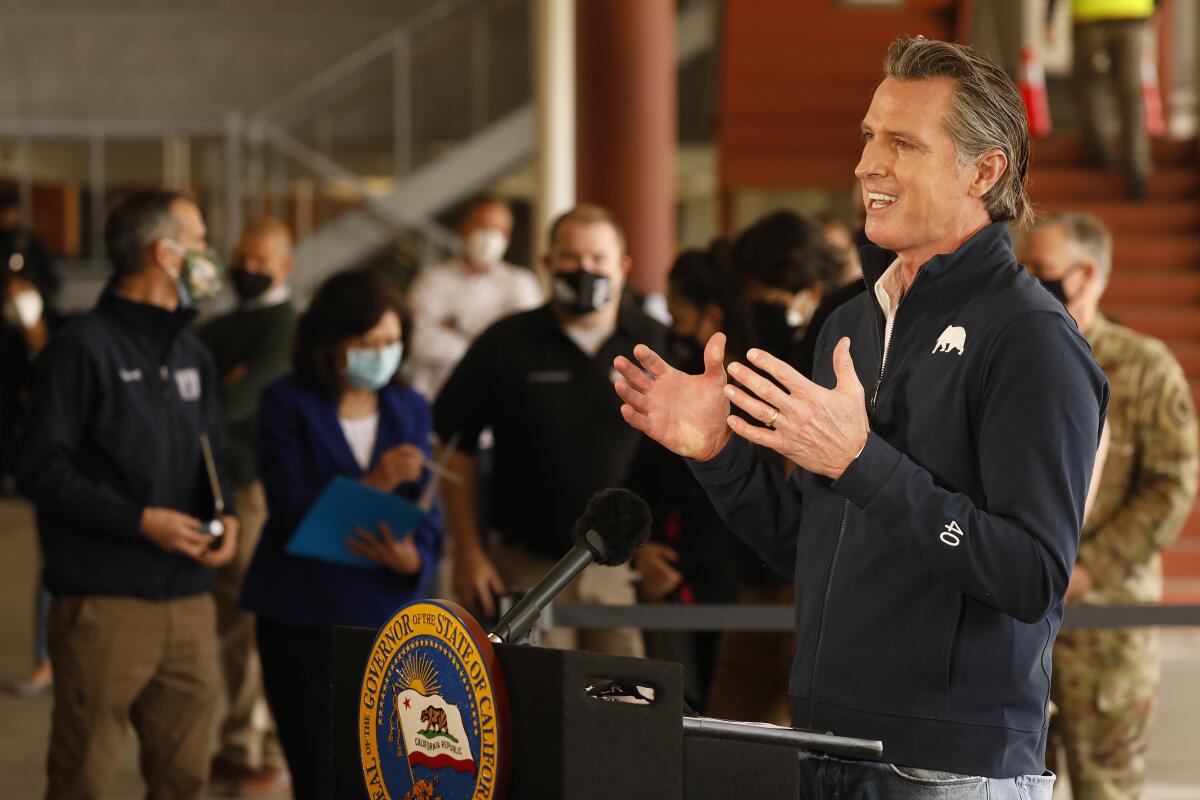
Gov. Gavin Newsom and legislative leaders announced Wednesday that they have agreed to provide low-income Californians a $600 state stimulus payment to help them weather financial hardships during the COVID-19 pandemic, part of a $9.6-billion economic recovery package that also includes $2.1 billion in grants for small businesses.
The “Golden State stimulus” payments provided under the state proposal, which will be expedited for legislative approval next week, are in addition to the $600-per-person stimulus checks already approved by Congress and would be on top of direct payments of up to $1,400 per person that have been proposed by House Democrats.
The package put forward for immediate action also provides more than $400 million in new federal funds for stipends of $525 per enrolled child for all state-subsidized child-care and preschool providers, which serve some 400,000 children in subsidized care statewide.
“As we continue to fight the pandemic and recover, I’m grateful for the Legislature’s partnership to provide urgent relief and support for California families and small businesses where it’s needed most,” Newsom said in a statement announcing the expedited relief package with Senate President Pro Tem Toni Atkins (D-San Diego) and Assembly Speaker Anthony Rendon (D-Lakewood).
The state has suffered significant economic losses since the pandemic began in March, with millions thrown out of work as businesses closed or operations were restricted at the direction of state health officials to slow the spread of the virus.
In all, the state will provide 5.7 million payments to low-income Californians as part of the $9.6-billion economic recovery package.
Aside from the federal funds for child-care assistance, the rest of the relief package comes from state taxpayer money and is made possible by tax revenue collections that were much better than expected.
The new relief package comes a few weeks after the Legislature and governor fast-tracked approval of an extension of protections against evictions through June for tenants who pay part of their rent.
The one-time $600 payment to households, which Newsom proposed last month, would cost about $2.3 billion and go to people including those receiving the California earned income tax credit for 2020. In addition, the agreement would provide a stimulus check to taxpayers with individual tax identification numbers who did not receive federal stimulus payments and whose income is below $75,000.
Beneficiaries would include immigrants who are in the country illegally who file tax forms. ITIN taxpayers who also qualify for the California earned income tax credit would receive a total of $1,200, state leaders said.
The bill extends protections approved last summer that were set to expire Sunday.
In all, the state would provide 5.7 million payments to low-income Californians.
California residents could be eligible for the earned income tax credit if they have annual incomes of $30,000 or less, which last year included 3.9 million taxpayers.
The relief package provides a $600 one-time grant to households enrolled in the CalWORKS public assistance program and recipients of supplemental security income and the state’s Cash Assistance Program for Immigrants program.
“Californians have been hurting,” Rendon said in a statement. “Our response tackles the human and the economic impacts of COVID in a way that echoes President Biden’s American Rescue Plan and will help those who are hurting most.”
California Gov. Gavin Newsom proposes extending eviction protections and expediting $2.6 billion in federal rental assistance for low-income tenants.
The state stimulus will provide needed help to the poorest Californians, but more assistance is required, said Courtney McKinney, a spokeswoman for the Western Center on Law and Poverty.
“Any money to help people stay afloat is needed right now,” McKinney said, adding that “it’s good news, but there is still much more needed.” In particular, she said, her group is supporting legislation that would provide food assistance regardless of immigration status.
Newsom and Democratic legislative leaders said the grants will help small businesses survive during the economic downturn caused by the pandemic.
“With billions of additional dollars we will have the capacity to provide ... tens of thousands of additional small businesses, nonprofit and cultural centers grants from $5,000 to $25,000,” Newsom said during a news conference Wednesday.
The grant proposal, which requires approval by the Legislature, builds on a $500-million program that has provided 21,000 small businesses with financial help since December, Newsom said.
The tax relief will be provided over the next several years by exempting the first $150,000 of expenses paid by federal Paycheck Protection Program and federal Economic Injury Disaster Loan funds. In addition, the package includes $116 million in fee waivers for two years for heavily affected service industries.
Senate Republican leader Scott Wilk of Santa Clarita, who has been critical of the governor’s handling of the pandemic, said financial assistance to small businesses had previously been proposed by Republican legislators.
“Throughout the pandemic, efforts to provide small businesses with much-needed assistance have fallen short,” Wilk said, adding that in the proposal announced Wednesday “we have a bipartisan solution to help California’s small businesses decimated by the governor’s ever-changing COVID policies.”
The assistance was also hailed by Denise Davis, spokeswoman for the California Chamber of Commerce.
“California’s small businesses are reeling from the economic fallout of COVID-19 shutdowns and need the financial bridge that grants, tax breaks and fee waivers offer so that they can stay afloat until our economy recovers,” Davis said.
Other provisions of the relief package announced Wednesday include:
- $100 million in emergency financial aid for qualifying low-income students carrying six or more units at California Community Colleges.
- $24 million for financial aid and services through Housing for the Harvest, which supports agricultural workers who have to quarantine because of COVID-19.
- $35 million for food banks and diapers.
- $6 million for outreach and application assistance to University of California, California State University and California Community Colleges students made newly eligible for CalFresh, the federal food assistance program.
A legislative budget committee is scheduled to hear the bills as early as Thursday, with floor votes possible Monday.
State leaders said they also agreed to restore funding for the Cal State and UC systems, the judiciary, Child Support Services and moderate-income housing that had been targeted for cuts next year before additional funding came from the federal government.
Cal State Chancellor Joseph I. Castro called the agreement to restore the system’s $299-million cut a “tremendous development.” University leaders had been concerned that the cuts could jeopardize its flagship program to increase graduation rates. UC officials did not comment.
Legislative leaders said Wednesday that they are in separate, ongoing discussions about measures that could be taken for the safe reopening of the state’s K-12 schools.
Times staff writers Teresa Watanabe and Nina Agrawal contributed to this report.
More to Read
Start your day right
Sign up for Essential California for news, features and recommendations from the L.A. Times and beyond in your inbox six days a week.
You may occasionally receive promotional content from the Los Angeles Times.

